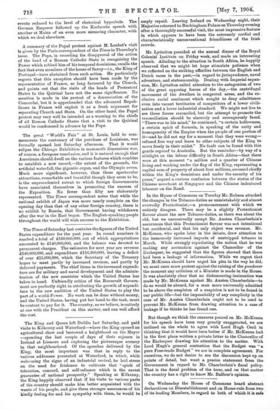Mr. Lyttelton presided at the annual dinner of the Royal
Colonial Institute on Friday week, and made an interesting speech. Alluding to the situation in South Africa, he happily observed that we might let hope stimulate patience when we reflected on the striking affinities between the English and Dutch races in the past,—in regard to jurisprudence, naval adventure, and statesmanship. Dealing with Imperial expan- sion, Mr. Lyttelton called attention to the antagonism of two of the great opposing forces of the day,—the centrifugal movement of the dwellers in congested areas, and the ex- clusive racial sentiment which sought to deny admittance even into vacant territories of competitors of a lower civili- sation and a lower industrial standard. We might not live to see these forces reconciled, but the attempt to promote the reconciliation should be sincerely and courageously faced. "There was to his mind," he continued, "a certain hollowness, a certain spirit of formula, in speaking of the unity and homogeneity of the Empire when the people of one portion of it—and he did not say for a moment that they were wrong— refused free way and leave to other subjects of the King to move freely in their midst." No fault can be found with this gentle reproof to Australia. But the reminder—by way of a sidelight on the labour difficulty in South. Africa—that there were at this moment " a million and a quarter of Chinese living and working under the flag of the King, representing a capital sum of property of about four millions, amassed chiefly within the King's dominions and under the security of his peace," argued a curious confusion between the status of the Chinese merchant at Singapore and the Chinese indentured labourer on the Rand.










































 Previous page
Previous page